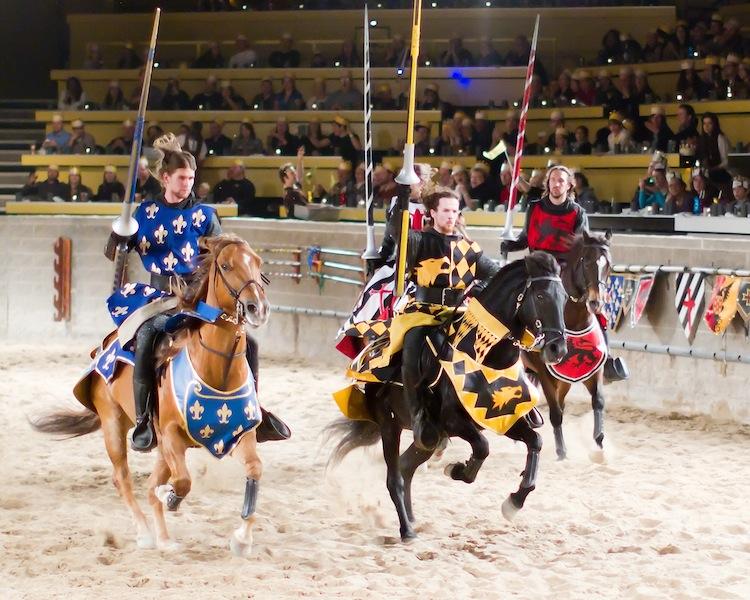Special Feature
Sparks fly from titanium swords in the urban coliseum.
The throng cheers and jeers, urging the performers to ride faster, tumble farther, fight harder.
“Chop off his ear,” I cry (several times). I always scream that when I come here.
Really, where else can a well-educated, respectable mother of three bellow that in public while eating with her hands?
The Medieval Times Dinner & Tournament has been tapping into our simplest instincts for nearly 30 years. The Toronto “castle” will celebrate its 20th year at the Exhibition Place this August, and really that is fitting.
Aside from knights and their squires beating the snot out of each other and fleecing the losers (to the victor went the spoils indeed), regular folks like farmers, craftsmen, and artisans came to the tournament to offer their products and services, just like our modern CNE.
The show couldn’t have survived in Toronto as long as it has without ties to the provincial school curriculum. The matinee show for schools has content that fits neatly into both Social Studies and Arts curricula, with learning opportunities at every grade.
Aside from the hundreds of civilians who come out to celebrate birthdays, anniversaries, or beer, glorious beer, diehard fans make up 20 to 30 percent of the evening audience.
Head knight Sean Delaney informed me that there are regular fans, crazed fans, and even a few stalkers.
Delaney took acting in university and trained as a martial artist in his youth. He’s been with Medieval Times for a decade.
The hunk on horseback has played every part in the show. Gals do swoon, but the show is very popular with men as well (surprise, surprise).
“It’s okay to have a love crush on the brand if you’re a guy,” says Cindy Wilson, Marketing and Sales Manager at the Toronto castle.
If you’ve seen the show before, you may be interested to learn that there have been some changes.
The plot is new, as are the costumes, the music, and the menu. Don’t panic, they’ve added an excellent vegetarian option. Carnivores still get half a chicken to eat with their hands.
You’ll be happy to know the stunt fighting is as vigorous and the period weapons are just as pointy as you remember. The torture museum is still available for pre- and post-show perusal.
The impeccably trained horses and knights, with their Masterpiece Theatre English accents, are as entertaining as ever.
How does one get a gig at Medieval Times? It takes a year of daily training to take someone with the appropriate athletic and theatrical background and turn him into an entry-level knight.
The most carefully trained actors in this show are actually the horses. Today’s concerns for the health and welfare of animals involved in shows are well-founded.
I had an opportunity to see head horse trainer for the Toronto castle, Franz Christian Garcia, at work.
I was surprised. This rather small man clicked and whistled and the stallion he was training jumped and danced and did the box step.
And it was so short. He taught the horse whatever he was teaching him in under 10 minutes.
Brevity of the lesson seems to make it fun for the horse, without becoming tedious for him. It’s all about winning trust and fostering cooperation, says Garcia.
“A horse has a personality of his own, a heart of his own. You can’t make him do anything he doesn’t want to do,” explained Garcia.
It turns out it is impossible to train a horse to do complex dressage with cruelty.
“They can learn good or bad things. That’s up to the person. If the person has no patience the horse is going to be full of bad habits. They learn to be defensive.”
According to Garcia, good trainers take their time, are patient, and build a friendship with each horse.
Positive experience is good instruction. An evening at Medieval Times is a great way to introduce young people to live theatre, the merits of historical fiction, and help wean all of us from our screen-centric rut.





